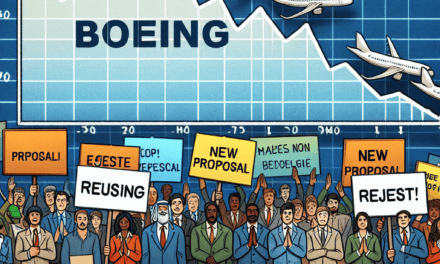“Emerging Markets on Edge: Election Uncertainty Spurs Investor Caution”
Introduction
Emerging markets are navigating a period of heightened uncertainty as upcoming elections across several key nations prompt investors to reassess their risk exposure. Political transitions often bring with them the potential for significant policy shifts, economic reforms, and changes in international relations, all of which can impact market stability and investor confidence. As a result, many investors are adopting a cautious stance, scaling back on riskier assets and reallocating their portfolios to mitigate potential volatility. This trend underscores the intricate relationship between political developments and financial markets, highlighting the challenges and opportunities that arise in times of electoral change.
Impact Of Political Uncertainty On Emerging Market Investments
Emerging markets have long been attractive to investors seeking high returns, driven by rapid economic growth and expanding consumer bases. However, the allure of these markets often comes with a caveat: political uncertainty. As elections approach in several key emerging economies, investors are increasingly wary, leading to a noticeable reduction in risk-taking activities. This trend underscores the intricate relationship between political stability and investment flows, highlighting the challenges faced by emerging markets in maintaining investor confidence.
Political uncertainty can significantly impact investor sentiment, as it introduces an element of unpredictability that can affect economic policies, regulatory environments, and overall market stability. In emerging markets, where institutions may not be as robust as in developed economies, the potential for abrupt policy shifts or political upheaval is a genuine concern. Consequently, as elections draw near, investors often adopt a cautious stance, reassessing their portfolios and, in many cases, reducing their exposure to these markets.
The impact of political uncertainty on emerging market investments is multifaceted. Firstly, it can lead to increased volatility in financial markets. Investors, uncertain about the future direction of economic policies, may react to political developments with heightened sensitivity, resulting in sharp fluctuations in asset prices. This volatility can deter long-term investment, as investors seek more stable environments to park their capital. Furthermore, political uncertainty can affect currency stability, with potential implications for inflation and interest rates. A depreciating currency can erode returns for foreign investors, making them more hesitant to commit funds to markets perceived as politically unstable.
Moreover, political uncertainty can influence the cost of borrowing for emerging market governments and corporations. As investors demand higher risk premiums to compensate for the perceived increase in political risk, borrowing costs can rise. This, in turn, can strain public finances and corporate balance sheets, potentially leading to reduced investment in critical infrastructure and development projects. The ripple effects of such a scenario can hinder economic growth, further exacerbating the challenges faced by these markets.
Despite these challenges, it is essential to recognize that not all emerging markets are equally affected by political uncertainty. Some countries have made significant strides in strengthening their institutions and implementing reforms that enhance transparency and accountability. These efforts can mitigate the adverse effects of political uncertainty, providing a more stable environment for investors. Additionally, the diversification of investment portfolios across different regions and sectors can help manage risk, allowing investors to capitalize on opportunities even in the face of political uncertainty.
In conclusion, while political uncertainty poses a significant challenge to emerging market investments, it is not an insurmountable barrier. Investors must carefully assess the political landscape and its potential impact on economic policies and market stability. By adopting a nuanced approach that considers both risks and opportunities, investors can navigate the complexities of emerging markets and potentially reap substantial rewards. As elections approach in various emerging economies, the interplay between political developments and investment decisions will continue to shape the landscape, underscoring the importance of vigilance and adaptability in the ever-evolving world of global finance.
Strategies For Investors Navigating Election-Driven Volatility
As emerging markets brace for a series of pivotal elections, investors are increasingly adopting cautious strategies to navigate the anticipated volatility. The political landscape in these regions often plays a significant role in shaping economic policies, and the uncertainty surrounding election outcomes can lead to heightened market fluctuations. Consequently, investors are re-evaluating their portfolios, seeking to mitigate risks while still capitalizing on potential opportunities.
One of the primary strategies investors are employing is diversification. By spreading investments across various asset classes and geographic regions, investors can reduce their exposure to any single market’s political risk. This approach not only helps in cushioning the impact of adverse election outcomes but also allows investors to benefit from growth in other areas that may not be as affected by political uncertainties. For instance, while an election in a major emerging market might lead to short-term volatility, other markets with stable political environments could offer more predictable returns.
In addition to diversification, investors are increasingly turning to hedging techniques to protect their portfolios. Instruments such as options and futures contracts can be used to offset potential losses resulting from market volatility. These financial tools provide a safety net, allowing investors to maintain their positions in emerging markets while safeguarding against significant downturns. Moreover, currency hedging has become particularly relevant, as political events can lead to substantial fluctuations in exchange rates, impacting the returns on foreign investments.
Another strategy gaining traction is the focus on quality investments. In times of uncertainty, investors are prioritizing companies with strong fundamentals, such as robust balance sheets, consistent cash flows, and a track record of resilience in challenging environments. These companies are often better equipped to withstand political and economic turbulence, making them attractive options for risk-averse investors. By concentrating on quality, investors can enhance the stability of their portfolios, even amidst election-driven volatility.
Furthermore, investors are paying closer attention to macroeconomic indicators and geopolitical developments. Understanding the broader economic context can provide valuable insights into how elections might influence market dynamics. For example, an election that results in a government committed to economic reforms could boost investor confidence and lead to market rallies. Conversely, political instability or policies perceived as unfavorable to business could trigger capital outflows and market declines. By staying informed about these factors, investors can make more informed decisions and adjust their strategies accordingly.
In light of these considerations, maintaining a long-term perspective is crucial for investors navigating election-driven volatility in emerging markets. While short-term fluctuations are inevitable, the underlying growth potential of these markets remains significant. Emerging economies often offer higher growth rates compared to developed markets, driven by factors such as favorable demographics, urbanization, and technological advancements. By focusing on the long-term prospects and maintaining a disciplined investment approach, investors can position themselves to benefit from the growth opportunities that these markets present.
In conclusion, as emerging markets face election jitters, investors are adopting a range of strategies to manage risk and capitalize on potential opportunities. Through diversification, hedging, a focus on quality investments, and a keen awareness of macroeconomic and geopolitical factors, investors can navigate the complexities of election-driven volatility. By maintaining a long-term perspective and staying informed, they can effectively manage their portfolios and harness the growth potential of these dynamic markets.
Historical Analysis Of Election Cycles In Emerging Markets
Emerging markets have long been characterized by their dynamic growth potential and the inherent volatility that accompanies such potential. Historically, election cycles in these markets have played a significant role in influencing investor sentiment and market performance. As political landscapes shift, investors often reassess their risk exposure, leading to fluctuations in capital flows. This phenomenon is particularly pronounced in emerging markets, where political stability and policy continuity are not always guaranteed.
To understand the impact of election cycles on emerging markets, it is essential to examine historical patterns. In many cases, elections in these regions have been associated with increased uncertainty, prompting investors to adopt a more cautious approach. This caution is often reflected in reduced investment inflows and heightened market volatility. For instance, during election periods, investors may anticipate changes in economic policies, regulatory frameworks, or leadership, all of which can significantly affect market conditions.
Moreover, the anticipation of electoral outcomes often leads to speculative behavior, as investors attempt to position themselves advantageously. This speculation can result in short-term market fluctuations, as seen in past election cycles in countries like Brazil, India, and South Africa. In these instances, markets have experienced both sharp declines and rapid recoveries, depending on the perceived stability and investor confidence in the post-election environment.
Transitioning from historical patterns to the present, it is evident that the current global economic climate further exacerbates election-related jitters in emerging markets. With geopolitical tensions, inflationary pressures, and fluctuating commodity prices, investors are increasingly wary of additional risks posed by political transitions. Consequently, there is a tendency to reduce exposure to these markets during election periods, opting instead for safer, more stable investments.
Furthermore, the role of international investors cannot be overlooked. Their influence on emerging markets is substantial, given their significant share of investment capital. During election cycles, these investors often reassess their portfolios, leading to capital outflows that can destabilize local economies. This behavior underscores the interconnectedness of global financial markets and the vulnerability of emerging economies to external shocks.
In addition to international factors, domestic considerations also play a crucial role in shaping investor sentiment during election cycles. Issues such as corruption, governance, and economic reform are often at the forefront of electoral debates in emerging markets. Investors closely monitor these discussions, as they provide insights into the future policy direction and potential risks associated with new leadership. A perceived lack of commitment to reform or transparency can deter investment, while a credible promise of stability and growth can attract capital.
As we look to the future, it is clear that emerging markets will continue to face election-related challenges. However, these challenges also present opportunities for investors willing to navigate the complexities of political transitions. By understanding historical trends and current dynamics, investors can better assess the risks and rewards associated with election cycles in these regions. Ultimately, while election jitters are an inherent aspect of investing in emerging markets, they also underscore the potential for growth and development that these economies offer. As such, a nuanced approach that balances caution with strategic investment can yield significant returns in the long run.
Risk Management Techniques For Emerging Market Portfolios

Emerging markets have long been attractive to investors seeking high returns, driven by rapid economic growth and expanding consumer bases. However, these markets are not without their challenges, particularly during election periods when political uncertainty can lead to increased volatility. As investors become more cautious, it is crucial to employ effective risk management techniques to navigate these turbulent times. Understanding the dynamics of emerging markets during elections is essential for portfolio managers aiming to mitigate risks while capitalizing on potential opportunities.
Firstly, it is important to recognize that political events in emerging markets can significantly impact financial markets. Elections often bring about policy changes, shifts in government priorities, and potential disruptions in economic stability. Consequently, investors may become wary, leading to capital outflows and increased market volatility. To address these concerns, portfolio managers should adopt a proactive approach by closely monitoring political developments and assessing their potential impact on investments. This involves staying informed about election timelines, key candidates, and their proposed policies, as well as understanding the historical context of political transitions in the region.
In addition to political analysis, diversification remains a cornerstone of risk management in emerging market portfolios. By spreading investments across various countries, sectors, and asset classes, investors can reduce their exposure to country-specific risks. This strategy not only helps in mitigating the impact of political uncertainty but also allows investors to benefit from growth opportunities in different regions. Moreover, diversification can be further enhanced by incorporating alternative investments, such as commodities or real estate, which may exhibit different risk-return profiles compared to traditional equities and bonds.
Another effective risk management technique is the use of hedging strategies. Derivatives, such as options and futures, can be employed to protect portfolios against adverse market movements. For instance, currency hedging can be particularly useful in emerging markets, where exchange rate fluctuations can significantly affect returns. By hedging currency risk, investors can safeguard their portfolios from potential devaluations or volatility in foreign exchange markets. Additionally, employing stop-loss orders and setting predefined exit points can help limit potential losses during periods of heightened uncertainty.
Furthermore, maintaining a robust liquidity management strategy is crucial for navigating election jitters in emerging markets. During times of political uncertainty, liquidity can dry up quickly, making it difficult to execute trades or exit positions without incurring significant costs. To address this, portfolio managers should ensure that a portion of their assets is held in liquid instruments, such as cash or short-term government bonds, which can be easily converted to cash if needed. This approach not only provides flexibility but also allows investors to take advantage of buying opportunities that may arise during market downturns.
Lastly, engaging with local experts and leveraging their insights can provide valuable perspectives on the political and economic landscape of emerging markets. Local analysts and advisors often have a deeper understanding of the nuances and intricacies of their respective markets, enabling them to offer informed opinions on potential risks and opportunities. By incorporating these insights into their decision-making process, portfolio managers can make more informed investment choices and better navigate the complexities of emerging markets during election periods.
In conclusion, while elections in emerging markets can introduce significant risks, they also present opportunities for astute investors. By employing a combination of political analysis, diversification, hedging strategies, liquidity management, and local expertise, portfolio managers can effectively manage risks and position their portfolios for long-term success. As emerging markets continue to evolve, adapting these risk management techniques will be essential for investors seeking to capitalize on the growth potential of these dynamic regions.
The Role Of Geopolitical Events In Shaping Market Sentiment
Emerging markets have long been a focal point for investors seeking high returns, but they are not without their challenges. One of the most significant factors influencing these markets is the geopolitical landscape, which can dramatically alter investor sentiment and, consequently, market dynamics. As elections approach in various emerging economies, investors often become jittery, leading to a reduction in risk exposure. This phenomenon underscores the critical role that geopolitical events play in shaping market sentiment.
Elections in emerging markets are particularly influential because they often bring about uncertainty regarding economic policies, regulatory changes, and political stability. Investors, who are inherently risk-averse, tend to react to this uncertainty by pulling back on investments, thereby affecting market liquidity and valuations. For instance, the anticipation of a potential shift in government policies can lead to volatility in currency and equity markets, as investors reassess the risk-reward balance of their portfolios. This cautious approach is not unfounded, as history has shown that political transitions can lead to significant economic reforms or, conversely, to instability and market disruptions.
Moreover, the impact of geopolitical events is not confined to the domestic sphere of the emerging market in question. In our increasingly interconnected global economy, the ripple effects of political changes can extend far beyond national borders. For example, a change in trade policies or international relations in one country can influence investor sentiment across an entire region. This interconnectedness means that investors must consider not only the direct implications of an election but also the broader geopolitical context in which it occurs.
In addition to elections, other geopolitical events such as international conflicts, trade negotiations, and diplomatic tensions can also play a pivotal role in shaping market sentiment. These events can lead to shifts in global capital flows, as investors seek to mitigate risk by reallocating assets to more stable environments. The recent trend of deglobalization, characterized by increasing protectionism and trade barriers, has further complicated the landscape for emerging markets. As countries become more insular, the potential for geopolitical tensions rises, adding another layer of complexity for investors to navigate.
Despite these challenges, emerging markets continue to offer attractive opportunities for those willing to embrace the associated risks. The key for investors is to remain vigilant and informed about the geopolitical developments that could impact their investments. By understanding the potential implications of political events, investors can better position themselves to capitalize on opportunities while mitigating risks. This requires a nuanced approach that balances the allure of high returns with the need for prudent risk management.
In conclusion, geopolitical events play a crucial role in shaping market sentiment in emerging markets. Elections, in particular, can lead to heightened uncertainty and volatility, prompting investors to reduce their risk exposure. However, by staying informed and adopting a strategic approach, investors can navigate these challenges and potentially benefit from the opportunities that emerging markets present. As the global landscape continues to evolve, the ability to anticipate and respond to geopolitical developments will remain a vital skill for investors seeking to thrive in these dynamic environments.
Comparing Investor Behavior In Developed Vs. Emerging Markets During Elections
In the realm of global finance, investor behavior during election periods often diverges significantly between developed and emerging markets. This divergence is primarily driven by the varying levels of political stability, economic maturity, and market transparency inherent in these regions. As elections approach, investors in emerging markets tend to exhibit heightened caution, often scaling back on riskier assets. This behavior contrasts with the more measured approach typically observed in developed markets, where political systems are generally more stable and predictable.
To begin with, the political landscape in emerging markets is frequently characterized by volatility and uncertainty. Elections in these regions can lead to significant policy shifts, which may affect everything from trade agreements to regulatory frameworks. Consequently, investors often adopt a risk-averse stance, preferring to wait until the political dust settles before making substantial financial commitments. This cautious approach is further compounded by the fact that emerging markets often lack the institutional robustness found in developed economies, making them more susceptible to abrupt changes in governance and policy.
In contrast, developed markets usually offer a more stable political environment, with well-established institutions and a history of peaceful transitions of power. Investors in these markets are generally more confident that election outcomes will not lead to drastic policy changes that could disrupt economic stability. As a result, while there may be some degree of market fluctuation during election periods, the overall investor behavior tends to be more stable and less reactionary compared to their counterparts in emerging markets.
Moreover, the economic maturity of developed markets provides an additional layer of security for investors. These economies typically have diverse and resilient financial systems that can absorb political shocks more effectively. In contrast, emerging markets often rely heavily on a few key industries or exports, making them more vulnerable to political and economic disruptions. This economic fragility can exacerbate investor anxiety during election periods, leading to a more pronounced withdrawal from riskier investments.
Furthermore, transparency and access to information play crucial roles in shaping investor behavior. Developed markets generally offer greater transparency, with comprehensive data and analysis readily available to investors. This access to information allows investors to make more informed decisions, reducing the likelihood of knee-jerk reactions to political events. On the other hand, emerging markets may suffer from a lack of transparency, with limited access to reliable data and analysis. This information gap can lead to increased uncertainty and speculation, prompting investors to adopt a more conservative approach during elections.
In addition, the role of international investors cannot be overlooked. Developed markets often attract a more diverse pool of international investors who are accustomed to navigating political cycles with a long-term perspective. In contrast, emerging markets may see a higher proportion of speculative investors who are more sensitive to short-term political risks. This difference in investor composition can further amplify the disparity in behavior between the two market types during election periods.
In conclusion, while elections invariably introduce a degree of uncertainty into financial markets, the impact on investor behavior varies significantly between developed and emerging markets. The political volatility, economic fragility, and lack of transparency that often characterize emerging markets lead investors to adopt a more cautious approach, scaling back on riskier assets until stability is restored. Conversely, the stability, maturity, and transparency of developed markets provide a more reassuring environment for investors, resulting in a more measured response to electoral events. Understanding these dynamics is crucial for investors seeking to navigate the complexities of global financial markets during election periods.
Case Studies: How Past Elections Have Affected Emerging Market Economies
Emerging markets have long been a focal point for investors seeking high returns, but they also come with inherent risks, particularly during election periods. Historically, elections in these markets have often led to significant economic fluctuations, as political uncertainty can cause investors to reassess their risk tolerance. Examining past elections provides valuable insights into how these political events can impact emerging market economies, offering lessons for both policymakers and investors.
One notable case is the 2018 Brazilian general election, which serves as a prime example of how political uncertainty can influence investor behavior. Leading up to the election, Brazil faced a turbulent political climate, with corruption scandals and economic instability dominating the headlines. As a result, investors became increasingly cautious, leading to a depreciation of the Brazilian real and a decline in stock market performance. However, once the election concluded and a clear political direction emerged, investor confidence gradually returned, stabilizing the currency and boosting market indices. This case illustrates how the resolution of political uncertainty can restore investor confidence, albeit after a period of volatility.
Similarly, the 2016 Philippine presidential election highlighted the impact of political rhetoric on investor sentiment. The election of Rodrigo Duterte brought about significant policy shifts, particularly in foreign relations and domestic security. Initially, Duterte’s controversial statements and unpredictable policy proposals led to heightened investor anxiety, causing capital outflows and a weakening of the Philippine peso. Over time, however, as the administration’s economic policies became clearer and more predictable, investor sentiment improved, leading to a recovery in both the currency and stock market. This example underscores the importance of clear and consistent policy communication in maintaining investor confidence during election periods.
In contrast, the 2019 Argentine presidential election demonstrated how prolonged political uncertainty can exacerbate economic challenges. Argentina was already grappling with high inflation and a struggling economy when the election cycle began. The prospect of a change in leadership led to increased market volatility, as investors feared potential shifts in economic policy. The election of Alberto Fernández, coupled with concerns over debt restructuring and fiscal policy, resulted in a sharp depreciation of the Argentine peso and a significant drop in stock market values. This case highlights the potential for elections to amplify existing economic vulnerabilities, particularly when policy direction remains uncertain.
Moreover, the 2013 Kenyan general election provides an example of how political stability can positively influence investor sentiment. Following the violence and instability of the 2007 election, the 2013 election was closely watched by both domestic and international investors. The peaceful conduct of the election and the subsequent smooth transition of power reassured investors, leading to increased capital inflows and a strengthening of the Kenyan shilling. This case demonstrates the critical role of political stability in fostering a favorable investment climate in emerging markets.
In conclusion, past elections in emerging markets reveal a complex interplay between political uncertainty and economic performance. While elections can lead to short-term volatility, the resolution of political uncertainty often restores investor confidence. However, the extent of the impact varies depending on the existing economic conditions and the clarity of policy direction post-election. For investors, understanding these dynamics is crucial in navigating the risks associated with emerging market elections. For policymakers, ensuring transparent and consistent communication can help mitigate the adverse effects of political uncertainty on economic stability. As emerging markets continue to play a vital role in the global economy, these lessons remain pertinent for future election cycles.
Q&A
1. **What are emerging markets?**
Emerging markets are nations with social or business activity in the process of rapid growth and industrialization. They are characterized by a developing economy and are often transitioning from a low-income, less-developed status to a more modern, industrial economy.
2. **Why do elections cause jitters in emerging markets?**
Elections can cause jitters in emerging markets due to the uncertainty they bring regarding future economic policies, political stability, and potential changes in government. This uncertainty can lead to volatility in financial markets as investors may become cautious.
3. **How do investors typically react to election-related uncertainty in emerging markets?**
Investors often react to election-related uncertainty by reducing their exposure to riskier assets. This can involve pulling back investments, reallocating funds to safer assets, or demanding higher risk premiums, which can lead to increased market volatility.
4. **What are some common risks associated with investing in emerging markets during election periods?**
Common risks include political instability, policy changes, currency fluctuations, and potential economic disruptions. These risks can affect market confidence and lead to capital outflows.
5. **How can emerging markets mitigate the impact of election jitters on their economies?**
Emerging markets can mitigate the impact by maintaining transparent and stable economic policies, ensuring fair and credible election processes, and building strong institutions that can withstand political changes.
6. **What role do central banks play in managing election-related market volatility in emerging markets?**
Central banks can play a crucial role by implementing monetary policies that stabilize the currency, control inflation, and provide liquidity to the financial system. They may also communicate effectively to reassure investors and maintain market confidence.
7. **Can election jitters in emerging markets affect global financial markets?**
Yes, election jitters in emerging markets can affect global financial markets, especially if the markets are large or interconnected with the global economy. Volatility in these markets can lead to broader risk aversion, impacting global investment flows and financial stability.
Conclusion
Emerging markets are experiencing heightened volatility and uncertainty as investors become increasingly cautious due to upcoming elections. Political instability and potential policy shifts associated with these elections are prompting investors to reduce their exposure to riskier assets in these regions. This risk aversion is leading to capital outflows, currency depreciation, and increased borrowing costs for emerging market economies. As a result, these markets may face economic challenges, including slower growth and financial instability, unless political clarity and investor confidence are restored.





